April 4, 2023
Newsletter MAFR - Law, Compliance, Regulation

♾️ follow Marie-Anne Frison-Roche on LinkedIn
♾️ subscribe to the Newsletter MAFR Regulation, Compliance, Law
____
► Full Reference: M.-A. Frison-Roche, "Face aux clauses de Compliance : le Juge (colloque du 7 avril 2023)" ("Facing Compliance clauses: the Judge (symposium of 7 April 2023)"), Newsletter MAFR - Law, Compliance, Regulation, 4 April 2023.
____
📧Read by freely subscribing other news of the Newsletter MAFR - Law, Compliance, Regulation
____
Compliance Law is starting to be known; mainly through two blocks:
Firstly the spectacular sanctions by which it made as its entry in Europe by the "BNPP sanction" of 2014.
🔴M.-A. Frison-Roche, 📝Le Droit de la Compliance, 2016
Secondly, the accumulation of tools, legal and non-legal, with which companies have equipped themselves: plans to detect and prevent breaches, internal investigations, mapping, ad hoc training, etc.
🔴M.-A. Frison-Roche (dir), 📘Compliance Tools, 2021
But what is the "compliance obligation" in the name of which these fearful and heavy sanctions are pronounced and these new and multiple tools are put in place?
We do not have a very clear idea.
That is why the Journal of Regulation & Compliance (JoRC) and its partner universities have chosen to focus on the topic of the Compliance Obligation in a series of symposiums held in 2023.
🔴JoRC, 🏗️L'obligation de compliance, 2023
It could be said that the company is "obliged" by Compliance because it is obliged by the Law, as Compliance would only mean obeying "regulations" (a term used to describe everything that is obligatory, from the Constitution to ethical charters, etc.). The English vocabulary "comply with" suggests this, as does the Chinese practice of Compliance. The difference would then only be the fact that the company shows its "stakeholders" that it does in fact respect all these texts that commit it.
But the practice and the jurist remember that what is sometimes considered as the heart of the Law, since Roman Law, is Obligations Law, having as its object Contract Law and Tort Law.
Yet, in practice, companies have put contracts concerning compliance everywhere, and they are relatively little studied.
🔴M.-A. Frison-Roche, 📝Contrat de compliance, clauses de compliance, 2023
These may be entire contracts whose very purpose is to entrust another with the task of fulfilling all or part of the compliance obligation incumbent on the company, with regard to personal data.
These may be clauses inserted in contracts with another purpose, for instance sales contracts in a value chain, where the company stipulates that the other company will also ensure compliance obligations for itself or for the other company, e.g. detect and prevent corruption, be vigilant, etc.
Contract Law has already taken on compliance in practice, especially in long-term economic transactions with an international dimension.
The judge has always been present in Obligation Law.
How is the triangle articulated: Judge - Compliance - Obligation?
The Judge has been present from the outset in the development of the Compliance Obligation through criminal liability, administrative liability and the obligation for the company to become a judge of itself, particularly through internal investigations.
🔴M.-A. Frison-Roche (dir.), 📘Compliance Jurisdictionalisation, 2023
The Judge is also present through Obligation Law stricto sensu, first of all through liability, which is transformed under the effect of the compliance system, which operates more in the logic of "accountability" and generates legal mechanisms of "ex ante liability".
🔴M.-A. Frison-Roche, 📝La responsabilité Ex Ante, pilier du Droit de la Compliance, 2022
In contractual matters, the Judge will intervene, in particular with regard to the stipulations which, in the contracts which form the architecture of the value chains, ensure the efficacy (and no longer only the effectiveness) of the duty of vigilance.
The Judge will then intervene under the French law of 2017, known as the "Vigilance Law",
🔴M.-A. Frison-Roche, 🚧Vigilance, Buts Monumentaux de la Compliance et "Société vigilante", 2023
but also, because the Judge is the "judge of the contract", he will intervene as such.
To identify the Obligation of Compliance,
🔴M.-A. Frison-Roche (dir.), 📘Compliance Obligation, 2024
it is therefore necessary to analyse the way in which the Judge apprehends or should in the future apprehend contracts and compliance clauses.
That's why, in the above-mentioned cycle of symposiums, a symposium is being held on 7 April 2023. It is co-organised by the Journal of Regulation & Compliance (JoRC) and the Law Faculty of Perpignan, and has been designed under the scientific direction of Walid Chaiehloudj and Marie-Anne Frison-Roche.
________

March 23, 2023
Publications

♾️ follow Marie-Anne Frison-Roche on LinkedIn
♾️ subscribe to the Newsletter MAFR Regulation, Compliance, Law
____
 ► Full reference: M.A. Frison-Roche, Thinking and using Vigilance through its Compliance Monumental Goals, Working Paper, March 2023.
► Full reference: M.A. Frison-Roche, Thinking and using Vigilance through its Compliance Monumental Goals, Working Paper, March 2023.
____
🎤 This Working Paper has been done as basis for the introduction of the colloquia La société vigilante ("Vigilant Company") at the Aix-Marseille University on March 24, 2023 (conference given in French)
____
📝It is also the basis of the article that introduces a special issue on La société vigilante
____
► Summary of the Working Paper: The concept of "Vigilance" is difficult to define. Probably because even as it is becoming a standard, it has just entered the legal systems. And what a splash it is! To understand it, it must not be isolated. Neither in the only French law attracting all the attention, all the fears, all the hopes, the so-called Loi Vigilance ("Vigilance Law"), nor in the only technical mechanisms that make Vigilance a reality.
Vigilance is itself only a part of a deeper movement, of which it is the advanced point, allowing us to anticipate the evolution of the whole: Compliance Law.
In this light and for not getting lost in it, because the stakes are so high that one quickly loses the measure of things, with each party lashing out at the others, so Vigilance, the key element of Compliance, requires above all alliances, that we can first examine the entry of Vigilance into the legal system and then understand it through the Monumental Goals which give the measure of it, i.e. both the scope and the limit, each one having to act within the margins that are theirs, States, companies, stakeholders, and judges.
A Will for tomorrow can then emerge today, carried by Europe.
____
🔓read the Working Paper⤵️
March 1, 2023
Interviews

♾️follow Marie-Anne Frison-Roche on LinkedIn
♾️subscribe to the Newsletter MAFR Regulation, Compliance, Law
____
► Full reference: M.-A. Frison-Roche, , F. Ancel, N. Roret, "Les juges vont être de plus en plus présents dans le droit de la compliance" ("Judges will be more and more involved in Compliance Law"), interview with Olivia Dufour, Actu-Juridique, 1st March 2023.
____
💬read the interview (in French)
____
► Presentation of the interview by the journal (in French) : "À l’instigation du professeur Marie-Anne Frison-Roche, l’École nationale de la magistrature (ENM) a proposé pour la première fois début février une formation en compliance à destination des magistrats et des avocats. François Ancel, conseiller la Cour de cassation, Nathalie Roret, avocate et directrice de l’ENM et Marie-Anne Frison-Roche plaident d’une seule voix pour le renforcement du rôle des acteurs judiciaires dans la compliance."
____
► Questions asked (in French):
- D’où est venue l’idée d’aborder ce droit en cours d’émergence qui semble encore très confidentiel ?
- En effet, on croit souvent savoir ce qu’est la compliance, en la confondant avec la conformité, pouvez-vous expliquer ce qui les distingue ?
- On constate, en lisant le programme de la formation, que toutes les branches du droit sont concernées par la compliance depuis le droit des sociétés jusqu’au pénal en passant par les contrats et la responsabilité. Pouvez-vous nous donner des exemples ?
- Comment se redistribuent les rôles entre les avocats, les juges et les entreprises dans cette nouvelle configuration qu’est la compliance ?
- En quoi est-ce important pour les magistrats d’appréhender ce nouvel univers ?
- Ces transformations sont-elles cantonnées à la compliance ou peuvent-elles sortir de son champ ?
- Par exemple qu’en est-il de la question très controversée du rôle de l’avocat à l’égard du juge ?
- Avez-vous constaté lors de cette formation une amélioration du dialogue entre les différents acteurs ?
- Cette formation va-t-elle être instituée de manière permanente dans la formation des magistrats et des avocats ? Une autre manifestation est-elle prévue ?
________

Feb. 2, 2023
Organization of scientific events
► Full reference: M.-A. Frison-Roche, co-organisation de la formation ENM Droit de la Compliance, co-organisé entre l'École nationale de la magistrature et le Journal of Regulation & Compliance (JoRC), les 2 et 3 février 2023.
____
► General presentation of the course: The two-day session is designed for magistrates and practicing lawyers who are not necessarily specialized, to enable them, based on concrete cases, to understand the issues, objectives, and methods of compliance mechanisms in companies, including the increasing judicialization and the supranational dimension strengthen, modifying the office of the judge and the role of lawyers.
The analysis is made from the angle of Civil Law (contract, tort), Company Law, Labor Law and Criminal Law, but also governance, financial markets, regulatory, climate and digital issues.
____
► Brief bibliography:
- M.-A. Frison-Roche (dir.), Compliance Jurisdictionalisation, coll. "Régulations & Compliance", Journal of Regulation & Compliance (JoRC) and Dalloz, 2023.
- M.-A. Frison-Roche (dir.), Compliance Monumental Goals, coll. "Régulations & Compliance", Journal of Regulation & Compliance (JoRC) and Dalloz, 2022.
- M.-A. Frison-Roche (dir.), Compliance Tools, coll. "Régulations & Compliance", Journal of Regulation & Compliance (JoRC) and Dalloz, 2021.
- N. Borga, J.-Cl. Marin, J.-Ch. Roda (dir), Compliance : l'entreprise, le régulateur et le juge, coll. Régulations & Compliance, Journal of Regulation & Compliance (JoRC) and Dalloz, 2018.
- M.-A. Frison-Roche (dir.), Pour une Europe de la Compliance, coll. "Régulations & Compliance", Journal of Regulation & Compliance (JoRC) and Dalloz, 2019.
- M.-A. Frison-Roche (dir.), Régulation, Supervision, Compliance, coll. "Régulations", Journal of Regulation & Compliance (JoRC) and Dalloz, 2017.
____
► Will speak:
🎤François Ancel, Judge at the Première chambre civile de la Cour de cassation ( First civil chamber of the Court of Cassation)
🎤Guillaume Beaussonie, Professor at Toulouse 1 Capitole University
🎤Jean-François Bohnert, Procureur national financier
🎤Gilles Briatta, Group General Secretary of the Groupe Société Générale
🎤Marie-Anne Frison-Roche, Director of the Journal of Regulation & Compliance (JoRC)
🎤Cécile Granier, senior lecturer at Jean-Moulin Lyon 3 University
🎤Jean-Michel Hayat, Premier Président honoraire de la Cour d'appel de Paris
🎤Christophe Ingrain, Avocat à la Cour
🎤Anne-Valérie Le Fur, Professor at Versailles Saint-Quentin-en-Yvelines University
🎤Stanislas Pottier, Senior Advisor to the General Management of Amundi
🎤Jean-Baptiste Racine, Professeur à l'Université Panthéon-Assas (Paris II)
🎤Juliette Thery, Membre du Collège de l'Arcom
____
Lire une présentation détaillée de la manifestation ci-dessous⤵️
Updated: Feb. 2, 2023 (Initial publication: March 31, 2021)
Thesaurus : Doctrine

► Full Reference: J.-B. Racine, "Compliance et Arbitrage. Essai de problématisation" ("Compliance and Arbitration : Problematisation", in M.-A. Frison-Roche (ed.), La juridictionnalisation de la Compliance, coll. "Régulations & Compliance", Journal of Regulation & Compliance (JoRC) and Dalloz, 2023, p. 265-279.
____
📕read a general presentation of the book, La juridictionnalisation de la Compliance, in which this article is published
____
► The summary below describes an article that follows an intervention in the scientific manifestation Compliance et Arbitrage, co-organised by the Journal of Regulation & Compliance (JoRC) and the University Panthéon-Assas (Paris II). This conference was designed by Marie-Anne Frison-Roche and Jean-Baptiste Racine, scientific co-directors, and took place in Paris II University on March 31, 2021.
In the book, the article will be published in Title II, devoted to: Compliance et Arbitrage.
____
► Summary of the article (done by the author): Under the consideration of the "Compliance Juridictionalisation", it is necessary to study in the links between Compliance and Arbitration. The arbitrator is a judge, he is even the natural judge of international trade. Arbitration is therefore naturally intended to meet compliance which transforms the action of companies in an international context. However, the links between compliance and arbitration are not obvious. It is not a question of providing firm and definitive answers, but rather, and above all, of asking questions. We are at the start of reflection on this topic, which explains why there is, for the time being, little legal literature on the subject of the relationship between Compliance and Arbitration. It doesn't mean there aren't connections. Quite simply, these relations may not have come to light, or they are in the making. We should research the existing or potential bridges between two worlds that have long gravitated separately: Compliance on the one hand, Arbitration on the other. The central question is: is or can the arbitrator be a compliance judge, and, if so, how?
In any event, the Arbitrator is thus in contact with matters requiring the methods, tools and logic of Compliance. In addition to the prevention and suppression of corruption, three examples can be given.
- Arbitration has been facing economic sanctions (notably embargoes) for several years. The link with Compliance is obvious, insofar as texts providing for economic sanctions are often accompanied by compliance mechanisms, as in the United States. The arbitrator is concerned as to the fate he reserves in the treatment of the dispute with the measures of economic sanctions.
- Competition Law is a branch that came into contact with Arbitration from the end of the 1980s. The arbitrability of this type of dispute is now established and arbitrators apply it regularly. At the same time, Compliance has also entered Competition Law, admittedly more strongly in the United States than in France. The existence, absence or insufficiency of a compliance program aimed at preventing violations of the competition rules are thus circumstances which may assist the arbitrator in the assessment of anti-competitive behavior.
- Environmental Law is also concerned. There is environmental Compliance, for example with regard to the French law of March 27, 2017 on the duty of vigilance. Companies are thus responsible for participating in the protection of the environment, by internalizing these concerns in their internal and external operations (in their sphere of influence). As soon as an arbitrator is in charge for settling a dispute relating to Environmental Law, the question of the relationship to Compliance, from this angle, naturally arises.
It is therefore the multiple interactions between Compliance and Arbitration, actual or potential, which are thus open.
________
Feb. 2, 2023
Thesaurus : Doctrine

► Full Reference: O. Douvreleur, "Compliance et juge du droit" ("Compliance and Judge ruling only on points of Law"), in M.-A. Frison-Roche (ed.), La juridictionnalisation de la Compliance, coll. "Régulations & Compliance", Journal of Regulation & Compliance (JoRC) and Dalloz, 2023, p. 465-471.
____
📕read a general presentation of the book, La juridictionnalisation de la Compliance, in which this article is published
____
► Summary of the article (done by the Journal of Regulation & Compliance): Compliance maintains with the judge complex relations, and even more with the judge ruling only on points of Law (in France, the Court de Cassation in the judicial order, the one who, in principle, does not know the facts that he leaves to the sovereign appreciation of the judges ruling on the substance of the disputes. At first glance, compliance is a technique internalised in companies and the place occupied by negotiated justice techniques leave little room for intervention by the judge ruling only on points of Law
However, his role is intended to develop, in particular with regard to the duty of vigilance or in the articulation between the different branches of Law when compliance meets Labor Law, or even in the adjustment between American Law and the other legal systems, especially French legal system. The way in which the principle of Proportionality will take place in Compliance Law is also a major issue for the judge ruling only on points of Law.
________
Feb. 2, 2023
Publications

🌐♾️ follow Marie-Anne Frison-Roche sur LinkedIn
🌐subscribe to the Newsletter MAFR Regulation, Compliance, Law
____
► Full Reference: M.-A. Frison-Roche, "Le juge, l'obligation de compliance et l'entreprise. Le système probatoire de la Compliance" ("The judge, the compliance obligation, and the company. The Compliance probationary system"), in M.-A. Frison-Roche (ed.), La juridictionnalisation de la Compliance, coll. "Régulations & Compliance", Journal of Regulation & Compliance (JoRC) and Dalloz, 2023, p 409-442.
____
📝read the article (in French)
____
🚧read the bilingual Working Paper which is the basis of this article, with additional developments, technical references and hyperlinks
____
📕read a general presentation of the book, La juridictionnalisation de la Compliance, in which this article is published
____
► Summary of the article (done by the Journal of Regulation & Compliance): the article aims to identify the link that must be established between the company in its relationship with the compliance obligations it assumes and the judges to whom it is accountable in this respect: this link is established by evidence. The evidentiary system of proof has yet to be constructed, and it is the purpose of this long study to lay the groundwork.
To this end, the article begins with a description of what is designated here as the "probatory square" in a "probatory system" that is superimposed on the system of rules of substantive legal system. This is all the more important because Compliance seems to be in frontal collision in its very principles with the general principles of the evidentiary system, in particular because it seems that the company would have to prove the existence of the Law or that it would have to bear in a definitive way the burden of proving the absence of violation, which seems to be contrary not only to the presumption of innocence but also to the principle of the freedom of action and of undertaking. In order to re-articulate Compliance Law, the obligations of compliance which legitimately weigh on the company, it is necessary to return to the probatory system specific to Compliance, so that it remains within the Rule of Law. This presupposes the adoption of a substantial definition of Compliance, which is not only compliance with the rules, which is only a minimal dimension, but implies that Compliance Law should be defined by the Monumental Goals on which the public authorities and the companies are in substantial alliance.
The evidentiary system of principle makes play between its four summits that are the burden of proof, the objects of proof this evidentiary square of principle, between the burden of proof, the means of proof and their admissibility. Compliance Law does not fall outside this evidential square, thus marking its full membership of the Rule of Law
In order to lay the foundations of the evidential system specific to Compliance Law, the first part of the article identifies the objects of proof which are specific to it, by distinguishing between the structural devices, on the one hand, and the expected behaviours, on the other. The first involves proving that the structures required to achieve the Monumental Goals of Compliance have actually been put in place. The object of proof is then the effectiveness of this implementation, which presents the effectiveness of the system. As far as behavioral obligations are concerned, the object of proof is the efforts made by the company to obtain them, the principle of proportionality governing the establishment of this proof, while the systemic efficiency of the whole reinforces the evidential system. However, the wisdom of evidence lies in the fact that, even though the principle remains that of freedom of evidence, the company must establish the effectiveness, efficiency, and effectiveness of the whole, independently of the burden of proof.
The second part of the article concerns those who bear the burden of proof in Compliance Law. The latter places the burden of proof on the company in principle, in view of its legal obligations. This burden comes from the legal origin of the obligations, which blocks the "round of the burden of proof". But in the interference of the different vertices of the evidentiary square, the question becomes more delicate when it comes to determining the contours of the compliance obligations that the company must perform. Moreover, the burden of proof may itself be the subject of proof, just as the company's performance of its legal obligations may also be the subject of contracts, which brings us back to the evidentiary system ordinarily applicable to contractual obligations. The situation is different when it comes to a "compliance contract" or when it comes to one or more compliance stipulations, concepts that are still not very well developed in Contract Law.
Furthermore, as all branches of Law belong to a legal system governed by the Rule of Law, other branches of law interfere and modify the methods and solutions of proof. This is the case when the fact, which is the object of proof, can give rise to a sanction, the Law of repression imposing its own solutions in the matter of the burden of proof.
In the third part of the article, the relevant means of proof in Compliance Law are examined, used in that Compliance Law is above all a branch of Law whose object is on the one hand information and on the other hand the Future. Open questions remain, such as whether companies could be forced by the Judge to build technologies to invent new means of proof. To show that they are indeed achieving the Monumental Goals they are charged with.
In the fourth part, the vital character of the pre-constitution of evidence is shown, which is the reflection of the Ex-Ante nature of Compliance Law: evidence must be pre-constituted to avoid the very prospect of having to use it, by finding all the means to establish the effectiveness, efficiency and even the effectiveness of the various Compliance Tools.
If companies do all this methodically, the Compliance evidence system will be established, in harmony with the general evidence system, Compliance Law and the Rule of Law.
________
Nov. 18, 2022
Conferences
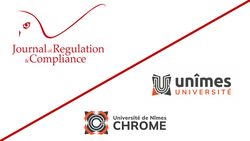
♾️ suivre Marie-Anne Frison-Roche sur LinkedIn
♾️s'abonner à la Newsletter MAFR Regulation, Compliance, Law
____
► Référence complète : M.-A. Frison-Roche, "Le juge, tiers régulateur des obligations contractuelles de compliance", in Journal of Regulation & Compliance (JoRC) et Université de Nîmes, Laboratoire CHROME, Compliance et Contrat : les acteurs et leurs stratégies, Nîmes, 18 novembre 2022.
____
🏗️Cette conférence prend place dans le cycle de colloques, organisé par le Journal of Regulation & Compliance (JoRC) et les Universités qui sont ses partenaires académiques, pendant l'année 2022/2023 autour du thème général L'obligation de compliance.
____
🎤 consulter la synthèse également faite de ce colloque
____
🧮Consulter le programme complet de cette manifestation
____
🚧lire le document de travail servant de base à cette conférence
____
📝Cette conférence sera la base d'un article, à paraître dans un ouvrage qui en résultera, dans sa version française, dans la collection 📚Régulation & Compliance coéditée entre le JoRC et les Editions Dalloz, et dans sa version anglaise, dans la collection 📚Compliance & Regulation coéditée entre le JoRC et les Editions Bruylant.
____

Nov. 12, 2022
Publications


♾️ suivre Marie-Anne Frison-Roche sur LinkedIn
♾️ s'abonner à la Newsletter MAFR Regulation, Compliance, Law
____
► Référence complète : M.-A. Frison-Roche, Automated Compliance, a pertinent tool for Compliance Law, the whole, document de travail, novembre 2022.
____
📝Ce document de travail sert de base à une participation à un débat sur "Automated Compliance : "the" solution or "a" solution?, qui déroule dans le Sommet global de Gaia-X le 17 novembre 2022.
____
►Résumé du document de travail : s'appuyant sur la présentation préalablement faite au débat par un membre de la Commission européenne, il s'agit de souligner trois éléments qui montrent que l' Automated Compliance (ou Compliance by design) est à la fois un outil central, mais qu'il n'est un outil du Droit de la Compliance dont il ne saurait remplir par sa seule performance technologique toutes les fonctions dans un Etat de Droit.
En premier lieu, l'Union européenne semble en difficulté lorsqu'elle veut tout à la fois bâtir un système juridique qui lui est propre sur la base de Lois dont chacune est la pièce d'un gigantesque puzzle pour obtenir une industrie pérenne et autonome dans une économie numérique mondiale totalement renouvelée, ce qui fait peser sur les entreprises une charge considérable d'intégration de toutes ces règles du jeu, tout en affirmant qu'il faut alléger la charge que la "réglementation" fait peser sur elles.
En second lieu, la meilleure solution pour résoudre cette ambition contradictoire est effectivement dans la technologique, les algorithmes intégrant directement les réglementations. Mais plus encore, l'ensemble de ces textes reposent sur une autonomie laissée en Ex Ante aux entreprises européennes pour s'organiser entre elles afin de concrétiser les "buts monumentaux" que l'Union européenne a décidé d'atteindre, dont la réalisation d'un cloud souverain est au centre.
Ainsi la distinction et l'articulation d'un "Droit de la Compliance", défini par ces "buts monumentaux", dont lequel l'intelligence artificielle est un outil, le "tout" (Compliance Law) et la "partie" (Automated Compliance) est essentielle.
En troisième lieu, cette distinction et articulation est non seulement bénéfice mais elle est obligatoire. En effet, même si le Droit de la Compliance constitue une branche du Droit, elle fonctionne dans le système juridique générale, qui ne fonctionne que par l'esprit des textes, les outils algorithmiques ne capturant que la lettre de ceux-ci. Ces tribunaux sont et seront au cœur du Droit de la Compliance, le cas Schrems l'a bien montré. C'est pourquoi la Technologie et le Droit doivent travailler ensemble, et davantage à l'avenir, notamment parce qu'un outil pour l'effectivité du Droit ne pourra jamais rendre compte de la vie même du système juridique.
________
🔓Lire ci-dessous les développements⤵️
Oct. 5, 2022
Interviews

🌐suivre Marie-Anne Frison-Roche sur LinkedIn
🌐s'abonner à la Newsletter MAFR Regulation, Compliance, Law
____
► Référence complète : M.-A. Frison-Roche, " Youporn : Le Droit doit se renouveler face à la transformation du monde par l'espace numérique", entretien avec Olivia Dufour, Actu-juridique, 5 octobre 2022.
___
💬Lire l'entretien dans son intégralité
____
Lire l'entretien précédent : 💬L'efficacité de la Compliance illustrée par l'affaire Youporn
____
► Présentation de l'entretien par le journal : "Comment parvenir à bloquer efficacement l’accès des mineurs aux contenus pornographiques sur internet ? C’est à cette difficile question que s’est attaquée l'Arcom (Autorité de régulation de la communication audiovisuelle et numérique). Avec pour l’instant un succès mitigé. Début septembre, alors que le régulateur demandait au juge de bloquer les cinq sites n’ayant pas obéi à son injonction de modifier leurs conditions d’accès, la justice a décidé de renvoyer le dossier devant un médiateur. Entre temps, un rapport sénatorial publié le 28 septembre souligne l’urgence d’agir. Nous avons demandé au professeur Marie-Anne Frison-Roche, spécialiste de droit de la compliance, comment à son avis il est possible de lutter efficacement contre les dérives de l’industrie pornographique".
____
► Questions posées :
- Dans l'affaire Youporn, la décision du tribunal judiciaire de renvoyer le dossier vers la médiation a suscité un certain émoi. N'est-ce pas le signe d'une forme de renoncement de la justice, avec tout ce que cela implique d'un point de vue symbolique ?
- En quoi le droit de la compliance serait-il plus efficace que les méthodes traditionnelles ?
- Mais n’est-ce pas, d’une certaine façon leur permettre de s’autoréguler, solution que précisément le rapport sénatorial écarte radicalement, estimant qu’elle n’est pas efficace ?
- Le problème, à en croire les sites concernés, c’est qu’il n’y aurait pas de solution qui soit à la fois efficace et respectueuse de la protection de la vie privée…
- Pensez-vous que la compliance ait une chance de réussir là où les outils plus traditionnels connaissent un échec relatif ?
________
Sept. 25, 2022
Publications
🌐 suivre Marie-Anne Frison-Roche sur LinkedIn
🌐 s'abonner à la Newsletter MAFR Regulation, Compliance, Law
____
► Référence complète : M.-A. Frison-Roche, "Fonder la compliance", in Revue de l'ACE, La compliance, n° spéc. n°157, septembre 2022, p.17-31.
____
► Résumé de l'article : L'article traite le sujet en 20 étapes
- Pourquoi fonder les pratiques de compliance ? Pour des impératif pratiques
- Fonder les pratiques de compliance pour rendre supportables, car compréhensibles, les pouvoirs et les charges concentrés dans les outils de Compliance
- Fonder les pratiques de compliance pour maîtriser un savoir technique exponentiel
- Fonder les pratiques pour y trouver la part du Droit
- Fonder la Compliance sur les process d’efficacité
- Rendre supportable la Compliance fondée sur les process d’efficacité par un mix de procédure et d’éthique
- Les professionnels de la Compliance fondée sur des process
- La place particulière de l’avocat et du juge dans la Compliance fondée sur des process
- Fonder la Compliance sur l’obligation de donner à voir par avance que l’on se conforme à la réglementation applicable
- L’aporie de la Compliance fondée sur l’obligation de donner à voir par avance que l’on se conforme à la réglementation applicable
- Les charges engendrées de la Compliance fondée sur l’obligation de donner à voir par avance que l’on se conforme à la réglementation applicable
- L’impraticabilité de la Compliance fondée sur l’obligation de donner à voir par avance que l’on se conforme à la réglementation applicable
- Fonder la Compliance sur des buts substantiels ponctuels
- Les professionnels de la Compliance impliquées par la Compliance fondée sur des buts substantiels ponctuels
- Fonder la Compliance par des buts substantiels globaux et à venir
- Fonder la Compliance par les Buts Monumentaux, négatifs et positifs
- Les professionnels de la Compliance fondée sur les Buts Monumentaux
- La place particulière de la population concernée et de l'Etat dans la Compliance fondée sur les Buts Monumentaux
- La place particulière de l’avocat et du juge dans la Compliance fondée sur les Buts Monumentaux
- L'avenir du Droit de l'Avenir
____
____
____
lire la revue dans son intégralité
_________

Updated: April 4, 2022 (Initial publication: Oct. 4, 2021)
Publications

🌐follow Marie-Anne Frison-Roche on LinkedIn
🌐subscribe to the Newsletter MAFR. Regulation, Compliance, Law
____
► Full Reference: M.-A. Frison-Roche, The Hypothesis of the category of Systemic Cases brought before the Judge, Working Paper, October 2021 and April 2022.
____
► This working paper has served as the basis for an introductory speech 🎤L'hypothèse de la catégorie des causes systémiques (The Hypothesis of the cateory of Systemic Cases), in a more general conference which I coordinated and moderated, 🧱L'office du juge et les causes systémiques, which is part of a general cycle covering Penser l'office du juge, specific conference attending the 9th May 2002 into the Grand Chamber of the Cour de cassation.
This Working Paper was drawn up in October 2021 to build the conference on the assumption that among the diversity of "cases" brought to the courts by litigants, some constitute a specific category: "systemic cases", justifying treatment that is both specific (in that they are systemic, calling in particular for procedural solutions common to all and distinguishable from the treatment of non-systemic cases) and common treatment beyond the diversity of judges who deal with them (judicial and administrative judges, criminal and non-criminal judges, French and non-French judges, judges of the member-States legal orders and European Union judges, etc.).
This working paper does not aim to deal with the whole subject, i.e. both to determine this category of "systemic causes" and the consequences that must be drawn from it for the judge's office, since that is the very purpose of the conference, which is built around several presentations: it aims to deal with the first part of the subject, i.e. the very existence of this new processual category, which is "systemic causes", leaving for other work the practical consequences to be drawn from it in the processual treatment that it calls for.
____
📝This Working Paper is also the basis of a forthcoming article
____
► Summary of the Working Paper: xx
________
Read below the developments⤵️
Jan. 19, 2022
Organization of scientific events

► Full Reference: Frison-Roche, M.-A., coordination and moderation of the conference L'office du juge et les causes systémiques (""The Office of the Judge and systemic causes"), in Cycle of Conferences, Penser l'office du juge ("Thinking the Office of the Judge"), Grand Chamber of the Cour de cassation, Paris, May 9, 2021, 17h-19h.
The conference is held in French.
____
► General presentation of the conference: the conference is based on the intervention of three judges, Christophe Soulard, Fabien Raynaud, and François Ancel, who think and debate among themselves on a hypothesis: the existence of "systemic causes". The hypothesis is that beyond and through the diversity of disputes and cases that are submitted to the most diverse judges, there is a category of cases that are systemic, which means containing in what is submitted to the judge for resolution a system. If such a category exists, which also raises the question of the diversity of systems and the difficulty arising from their submission to rules that are not legal (for example economic, biological, financial "laws", etc.) , then the judge should take this into account, both in the procedure and in the judgment they make on the case and in the way they formulate et restitute this judgment.
____
📝read the presentation of this conference by the Cour de cassation (in French)
📝read the program of the cycle of conferences 2022 (in French)
____
🎥see the conference video (in French)
🎥 see the synthesis video of the conference, made in situ by Marie-Anne Frison-Roche (in French)
____
✏️read the notes taken during the conference to make the synthesis (in French)
📝read the article of Marie-Anne Frison-Roche restituting this conference, published in the Recueil Dalloz (in French)
____
►read the works, basis of the two interventions of Marie-Anne Frison-Roche
🚧 L'hypothèse de la "cause systémique (made before the conference to prepare it), available en English
📝Synthese of the conference (made during the conference)
________
Sept. 23, 2021
Thesaurus : Doctrine

► Full Reference: S. Schiller, "A single judge in the event of an international breach of compliance obligations?", in M.-A. Frison-Roche (ed.), Compliance Jurisdictionalisation, Journal of Regulation & Compliance (JoRC) and Bruylant, coll. "Compliance & Regulation", to be published.
____
📘read a general presentation of the book, Compliance Jurisdictionalisation, in which this article is published
____
► Summary of the article (done by the Author, translated by the Journal of Regulation & Compliance): Given the very international nature of the topic apprehended, the actors involved and therefore the compliance disputes, it is essential to know if a person can be implicated before several judges, attached to different states or even if he can be condemned by several jurisdictions. The answer is given by the non bis in idem principle, which is the subject of a abondant case law on the basis of Article 4 of Protocol n°7 of the ECHR, clearly inapplicable for jurisdictions emanating from different States.
To assess whether breaches of compliance obligations may be subject to multiple sanctions in different states, it will first be necessary to ascertain whether there is a textual basis to be invoked.
At European level, Article 50 of the Charter of Fundamental Rights now allows the principle of ne bis in idem to be invoked. Applicable to all areas of compliance, it provides very strong protection which covers not only sanctions, but also prosecutions. Like its effects, the scope of Article 50 is very broad. The procedures concerned are those which have a repressive nature, beyond those pronounced by criminal courts in the strict sense, which makes it possible to cover the convictions pronounced by one of the many regulatory authorities competent in matters of compliance.
Internationally, the situation is less clear. Article 14-7 of the International Covenant on Civil and Political Rights may be invoked, if several obstacles are overcome, including the decision of 2 November 1987 of the Human Rights Committee which restricted it to the internal framework, requiring a double conviction by the same State.
Even if these principles are applicable, two specificities of compliance situations risk hampering their application, the first related to the applicable procedural rules, in particular the rules of jurisdiction, the second related to the specificities of the situation.
The application of the non bis in idem rule is only formally accepted with regard to universal jurisdiction and personal jurisdiction, that is to say extraterritorial jurisdiction, which is only part of the jurisdiction. . The Cour de cassation (French Judiciary Supreme Court) confirmed this in the famous so-called “Oil for food” judgment of March 14, 2018. The refusal to recognize this principle as universal, regardless of the jurisdiction rule in question, deprives French companies of a defense. Moreover, the repression of breaches of compliance rules is more and more often resolved through transactional mechanisms. The latter will not always fall within the scope of European and international rules laying down the non bis in idem principle, for lack of being sometimes qualified as "final judgment" under the terms of Article 50 of the Charter of Fundamental Rights of the European Union and Article 14-7 of the International Covenant on Civil and Political Rights.
Breaches in terms of compliance are often based on multiple acts. This results from prescriptions the starting point of which is delayed at the last event and a facilitated jurisdiction for French courts when only one of the constitutive facts is found in France. In terms of compliance, the non bis in idem principle therefore generally does not protect companies and does not prevent them from being sued before the courts of two different countries for the same case. It nevertheless grants them another protection by obliging them to take into account foreign decisions in determining the amount of the penalty. The sanction against Airbus SE in the Judicial Convention of Public Interest (CJIP) of January 29, 2020 is a perfect illustration of this.
Breaches in terms of compliance are often based on multiple acts. This causes delays in the starting point of prescriptions, starting point delayed at the last event, and this facilitates judicial jurisdiction for French courts when only one of the constitutive facts is found in France. In terms of compliance, the non bis in idem principle therefore generally does not protect companies and does not prevent them from being sued before the courts of two different countries for the same case. It nevertheless grants them another protection by obliging them to take into account foreign decisions in determining the amount of the penalty. The sanction against Airbus SE in the Convention judiciaire d'intérêt public -CJIP (French Judicial Convention of Public Interest) of January 29, 2020 is a perfect illustration of this.
____
🦉This article is available in full text to those registered for Professor Marie-Anne Frison-Roche's courses
________
Sept. 23, 2021
Thesaurus : Doctrine

► Full Reference: J. Morel-Maroger, "The application of compliance standards by European Union judges", in M.-A. Frison-Roche (ed.), Compliance Jurisdictionalisation, Journal of Regulation & Compliance (JoRC) and Bruylant,coll. "Compliance & Regulation", to be published.
____
📘read a general presentation of the book, Compliance Jurisdictionalisation, in which this article is published
____
► Summary of the article (done by the Author): Compliance rules are intended to pursue objectives of public interest – or monumental goals – and thereby in principle modify and guide the behaviour of economic operators. In order to achieve these objectives, the full spectrum of norms are used in compliance matters. What is and what should be the role of the judges of the European Union in the development of compliance rules ?
As in domestic law, the legality of compliance standards developed by regulatory authorities has been challenged. It will first be necessary to analyse what control the judges of the European Union have over these rules. The question arises essentially as regards the rules of soft law, the challenge of which can be considered in two ways : by way of an action for annulment and by exception by way of a preliminary ruling.
But beyond the control of the legality of compliance rules exercised by European judges, they also contribute to their application. The effectiveness of compliance rules depend above all on them being followed by those to whom they are addressed, and economic operators are undoubtedly the first actors of its success. But the judges of the European Union, competent to settle disputes concerning the application of European Union law between the Member States, the European institutions, and individual applicants, may be also be involved in ensuring the effectiveness of European compliance rules and in interpreting them.
____
🦉This article is available in full text to those registered for Professor Marie-Anne Frison-Roche's courses
________
Nov. 12, 2020
Thesaurus : Doctrine
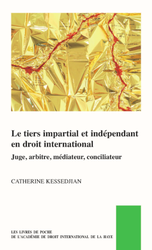
Full reference: Kessedjian, C., Le tiers impartial et indépendant en droit international. Juge, arbitre, médiateur, conciliateur, Académie de Droit international de La Haye, 2020, 769p.
Read the forth of cover (in French)
Read the table of content (in French)
Sept. 29, 2020
Newsletter MAFR - Law, Compliance, Regulation

Full reference: Frison-Roche, M.-A., Judge between Platform and Regulator: current example of Uber case in U.K., Newsletter MAFR - Law, Compliance, Regulation, 29th of September 2020
Read by freely subscribing the other news of the Newsletter MAFR - Law, Compliance, Regulation
Summary of the news:
On 22nd of September 2017, Transport of London (TFL), London Transport Regulator, refused to renew the licence, granted on 31st of May 2012 for 5 years, authorizing Uber to transport people because of criminal offenses committed by Uber's drivers. On 26th of June 2018, The Westminster Court prolonged Uber's licence for 15 months under the condition that the platform prevent the reproachable behaviors of its drivers. After these 15 months, the TFL refused once again to prolonge Uber's licence because of the persistence of aggressions against passengers. Uber, once again, contest this decision before the Westminster Court.
In a decision of 28th of September 2020, the Court observes that during the 15 months, the platform implemented many measures to prevent aggressions, that the level of maturity of these measures has improved over time and that the number of offenses was reduced over the period (passing from 55 in 2018 to 4 in 2020). The Court estimated the the implementation of this actions is sufficient to grant a new licence to Uber.
We can learn three lessons from this decision:
- The Compliance obligation is not a result obligation but a mean obligation, which means that it is not reasonable to expect from a crucial operator (Uber, for instance) that it prevent every cases of agression but that it is salient to judge it on the effort it deploys to try to be closer to this ideal situation. Moreover, the crucial operator must be proactive, that is going away from the figure of passive subject of Law who apply measures enacted by the regulator in terms of fighting against aggressions to be an actor of the research of the best way to fight abusive behaviors, internalizing this "monumental goal.
- The judge appreciates the violation committed by those whose the firm is responsible "in context", that is evaluates the concrete situation in a reasonable way.
- It is the judge who decides in last resort and like the crucial operator, it must be reasonable.
Read to go further:
Updated: Sept. 5, 2019 (Initial publication: April 30, 2019)
Publications
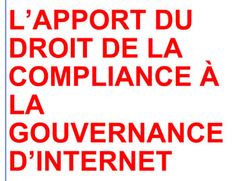
♾️ follow Marie-Anne Frison-Roche on LinkedIn
♾️subscribe to the Newsletter MAFR Regulation, Compliance, Law
____
► Full Reference: M.-A. Frison-Roche, L'apport du Droit de la Compliance dans la Gouvernance d'Internet (The contribution of Compliance Law to the Internet Governance), Report asked by the French Government, published the 15th of July 2019, 139 p.
___
► Report Summary. Governing the Internet? Compliance Law can help.
Compliance Law is for the Policy Maker to aim for global goals that they require to be achieved by companies in a position to do so. In the digital space built on the sole principle of Liberty, the Politics must insert a second principle: the Person. The respect of this One, in balance with the Freedom, can be required by the Policy Maker via Compliance Law, which internalises this specific pretention in the digital companies. Liberalism and Humanism become the two pillars of Internet Governance.
The humanism of European Compliance Law then enriches US Compliance law. The crucial digital operators thus forced, like Facebook, YouTube, Google, etc., must then exercise powers only to better achieve these goals to protect persons (against hatred, inadequate exploitation of data, terrorism, violation of intellectual property, etc.). They must guarantee the rights of individuals, including intellectual property rights. To do this, they must be recognized as "second level regulators", supervised by Public Authorities.
This governance of the Internet by Compliance Law is ongoing. By the European Banking Union. By green finance. By the GDPR. We must force the line and give unity and simplicity that are still lacking, by infusing a political dimension to Compliance: the Person. The European Court of Justice has always done it. The European Commission through its DG Connect is ready.
► 📓 Read the reporte (in French)
📝 Read the Report Summary in 3 pages (in English)
📝 Read the Report Summary in 6 pages (in English)
____
► Plan of the Report (4 chapters): an ascertainment of the digitization of the world (1), the challenge of civilization that this constitutes (2), the relations of Compliance mechanisms as it should be conceived between Europe and the United States, not to mention that the world is not limited to them, with the concrete solutions that result from this (3) and concrete practical solutions to better organize an effective digital governance, inspired by what is particularly in the banking sector, and continuing what has already been done in Europe in the digital field, which has already made it exemplary and what it must continue, France can be force of proposal by the example (4).
____
📝 Read the written presentation of the Report done by Minister Cédric O (in French).
____
💬 Read the interview published the 18 July 2019 : "Gouvernance d'Internet : un enjeu de civilisation" ( "Governing Internet: an Issue of Civilization"), given in French,
📻 Listen the Radio broadcast of July 21, 2019 during which its consequences are applied to the cryptocurrency "Libra" (given in French)
🏛 Presentation of the Report to the Conseil Supérieur de l'Audiovisuel- CSA (French Council of Audiovisual) on Septembre 5, by a discussion with its members presentation (in French)
💬 Read the Interview published the 20 December 2019 : "Le droit de la compliance pour réguler l'Internet" ("Compliance Law for regulate Internet"), given in French
____
read below the 54 propositions of the Report ⤵️
May 29, 2019
Thesaurus : Doctrine
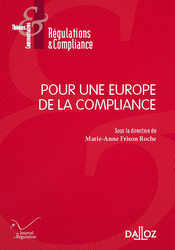
► Full Reference : K. Lenaerts, "Le juge de l'Union européenne dans une Europe de la Compliance" ("The Judge of the European Union in the Europe of the Compliance"), in M.-A. Frison-Roche (ed.), Pour une Europe de la Compliance, series "Régulations & Compliance", Dalloz, 2019, p.1-12.
____
📕read a general presentation of the book, Pour une Europe de la Compliance, in which this article is published
____
► Summary of the article (done by the Journal of Regulation & Compliance):
____
🦉This article is available in full text to those registered for Professor Marie-Anne Frison-Roche's courses
________
May 29, 2019
Editorial responsibilities : Direction of the collection "Regulations & Compliance", JoRC & Dalloz

♾️ follow Marie-Anne Frison-Roche on LinkedIn
♾️ subscribe to the Newsletter MAFR Regulation, Compliance, Law
____
► Full Reference: M.-A. Frison-Roche (ed.), Pour une Europe de la Compliance (For the Europe of the Compliance), series "Régulations & Compliance", Dalloz, 2019, 124 p.
____
This volume is the continuation of the books dedicated to Compliance in this collection.
📚Read the other books' presentations of the collection about Compliance:
🕴️M.-A. Frison-Roche (ed.), 📕La juridictionnalisation de la Compliance, 2023
🕴️M.-A. Frison-Roche (ed.), 📕Les Buts Monumentaux de la Compliance, 2022
🕴️M.-A. Frison-Roche (ed.), 📕Les outils de la Compliance, 2021
🕴️N. Borga, 🕴️J.-Cl. Marin &🕴️J.-Ch. Roda (ed.), 📕Compliance : l'Entreprise, le Régulateur et le Juge, 2018
🕴️M.-A. Frison-Roche (ed.), 📕Régulation, Supervision, Compliance, 2017
🕴️M.-A. Frison-Roche (ed.),📕 Internet, espace d'interrégulation, 2016
📚Read the presentations of the other titles of the collection.
____
► General presentation of the book: This book is written in French. The topic is : "For the Europe of the Compliance".
See below its general presentation in English.
The political dimension is intrinsic to the Compliance Law. Indeed, compliance mechanisms consist of internalizing in certains companies the obligation to implement goals of general interest set by Public Authorities. These public bodies control the Ex Ante reorganization that implies for these companies and punish Ex Post the possible structural inadequacy of these compagnies, becoming transparent for this purpose.
This new mode of governance establishes a continuum between Regulation, Supervision, Compliance (book published in 2017) and renew the links between Companies, Regulators and Judges!footnote-1600.
This political dimension must be increased: the Compliance Law of Compliance must today be used to build Europe.
One can observe not only the construction of the European Compliance Law, object-by-object, sector-by-sector, purpose-by-purpose, but also the construction of the European Compliance Law that transcends and unifies them. Becoming independent of American Law and ceasing to be in reaction, even on the defensive, the Compliance Law contributes to the European project, offering it a higher ambition, that Europe can carry and, by this way, can carry the Europe itself, not only to preserve the European economy from corruption or money laundering, but by claiming the protection of nature and human beings.
This is why the book describes the "reasons and objectives" of the Europe of the Compliance, which makes it possible to describe, detect and even predict the ways and means.
____
► Understand the book through the Table of Contents and the summaries of each article:
🕴️M.-A. Frison-Roche, 📝Avant propos
🕴️K. Lenaerts, 📝Le juge de l'Union européenne dans une Europe de la compliance
🕴️M.-A. Frison-Roche, 📝Un droit substantiel de la compliance, appuyé sur la tradition européenne humaniste
I. LES RAISONS ET LES OBJECTIFS D'UNE EUROPE DE LA COMPLIANCE (THE REASONS AND OBJECTIVES OF THE EUROPE OF THE COMPLIANCE)
🕴️X. Musca, 📝Construire une Europe de la compliance en donnant une meilleure place aux entreprises
🕴️P. Vimont, 📝La place de la diplomatie dans l'avancée d'une Europe de la compliance
🕴️P. Sellal, 📝Les vertus de la compliance : une réponse possible aux faiblesses de l'Union européenne ?
🕴️J.-J. Daigre, 📝Compliance, entreprise et Europe
II. LES VOIES ET MOYENS D'UNE EUROPE DE LA COMPLIANCE (THE WAYS AND MEANS OF THE EUROPE OF THE COMPLIANCE)
🕴️J.-Cl. Marin, 📝Quels outils pour la construction du droit de la compliance en Europe ?
🕴️M. Canto-Sperber, 📝La compliance et les définitions traditionnelles de la vertu
🕴️T. Bonneau, 📝Compliance et secteur bancaire et financier en Europe
🕴️C. Duchaine, 📝L'Agence française anticorruption, à l'appui de l'Europe de la compliance
🕴️D. Martin, 📝Les contraintes et les vertus de la compliance
🕴️A. de La Cotardière, 📝Construire une Europe de la compliance lisible pour les entreprises
________
May 29, 2019
Publications
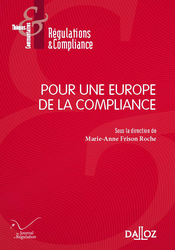
♾️ follow Marie-Anne Frison-Roche on LinkedIn
♾️ subscribe to the Newsletter MAFR Regulation, Compliance, Law
____
► Full Reference: M.-A. Frison-Roche (ed.), Pour une Europe de la Compliance (For the Europe of the Compliance), series "Régulations & Compliance", Dalloz, 2019, 124 p.
____
This volume is the continuation of the books dedicated to Compliance in this collection.
📚Read the other books' presentations of the collection about Compliance:
🕴️M.-A. Frison-Roche (ed.), 📕La juridictionnalisation de la Compliance, 2023
🕴️M.-A. Frison-Roche (ed.), 📕Les Buts Monumentaux de la Compliance, 2022
🕴️M.-A. Frison-Roche (ed.), 📕Les outils de la Compliance, 2021
🕴️N. Borga, 🕴️J.-Cl. Marin &🕴️J.-Ch. Roda (ed.), 📕Compliance : l'Entreprise, le Régulateur et le Juge, 2018
🕴️M.-A. Frison-Roche (ed.), 📕Régulation, Supervision, Compliance, 2017
🕴️M.-A. Frison-Roche (ed.),📕 Internet, espace d'interrégulation, 2016
📚Read the presentations of the other titles of the collection.
____
► General presentation of the book: This book is written in French. The topic is : "For the Europe of the Compliance".
See below its general presentation in English.
The political dimension is intrinsic to the Compliance Law. Indeed, compliance mechanisms consist of internalizing in certains companies the obligation to implement goals of general interest set by Public Authorities. These public bodies control the Ex Ante reorganization that implies for these companies and punish Ex Post the possible structural inadequacy of these compagnies, becoming transparent for this purpose.
This new mode of governance establishes a continuum between Regulation, Supervision, Compliance (book published in 2017) and renew the links between Companies, Regulators and Judges
This political dimension must be increased: the Compliance Law of Compliance must today be used to build Europe.
One can observe not only the construction of the European Compliance Law, object-by-object, sector-by-sector, purpose-by-purpose, but also the construction of the European Compliance Law that transcends and unifies them. Becoming independent of American Law and ceasing to be in reaction, even on the defensive, the Compliance Law contributes to the European project, offering it a higher ambition, that Europe can carry and, by this way, can carry the Europe itself, not only to preserve the European economy from corruption or money laundering, but by claiming the protection of nature and human beings.
This is why the book describes the "reasons and objectives" of the Europe of the Compliance, which makes it possible to describe, detect and even predict the ways and means.
____
► Understand the book through the Table of Contents and the summaries of each article:
🕴️M.-A. Frison-Roche, 📝Avant propos
🕴️K. Lenaerts, 📝Le juge de l'Union européenne dans une Europe de la compliance
🕴️M.-A. Frison-Roche, 📝Un droit substantiel de la compliance, appuyé sur la tradition européenne humaniste
I. LES RAISONS ET LES OBJECTIFS D'UNE EUROPE DE LA COMPLIANCE (THE REASONS AND OBJECTIVES OF THE EUROPE OF THE COMPLIANCE)
🕴️X. Musca, 📝Construire une Europe de la compliance en donnant une meilleure place aux entreprises
🕴️P. Vimont, 📝La place de la diplomatie dans l'avancée d'une Europe de la compliance
🕴️P. Sellal, 📝Les vertus de la compliance : une réponse possible aux faiblesses de l'Union européenne ?
🕴️J.-J. Daigre, 📝Compliance, entreprise et Europe
II. LES VOIES ET MOYENS D'UNE EUROPE DE LA COMPLIANCE (THE WAYS AND MEANS OF THE EUROPE OF THE COMPLIANCE)
🕴️J.-Cl. Marin, 📝Quels outils pour la construction du droit de la compliance en Europe ?
🕴️M. Canto-Sperber, 📝La compliance et les définitions traditionnelles de la vertu
🕴️T. Bonneau, 📝Compliance et secteur bancaire et financier en Europe
🕴️C. Duchaine, 📝L'Agence française anticorruption, à l'appui de l'Europe de la compliance
🕴️D. Martin, 📝Les contraintes et les vertus de la compliance
🕴️A. de La Cotardière, 📝Construire une Europe de la compliance lisible pour les entreprises
________
Frison-Roche, M.-A., Compliance, see
Jan. 1, 2019
Thesaurus : Doctrine
Référence complète : Lasserre, V., "La formation des médiateurs", in Archives de philosophie du droit (APD), La médiation, t. 61, 2019, p.117-127.
____
Voir la présentation partielle de la collection dans laquelle l'ouvrage est publié.
Dec. 24, 2018
Law by Illustrations

Le Droit n'est fait que de mots. L'essentiel est donc de les ranger (exercice de qualification) pour que se déclenche à propos d'eux un régime juridique, par exemple la liberté, l'autorisation ou l'interdiction.
Prenons un exemple américain, un exemple chéri par cette culture-là : le port d'arme.
Un juge fédéral de New-York a rendu une Ordonnance le 14 décembre 2018 à propos de la qualification juridique d'un nunchaku
En effet en 1974 l'Etat de New-York a interdit leur fabrication, leur transport, leur stockage, leur possession. 35 ans après, un juge estime que ce texte, tel qu'il est rédigé, est contraire au droit constitutionnel de porter une arme, ce qui anéantit la prohibition.
Pourquoi ?
En effet, la distinction expressément soutenue par le demandeur entre la possession à domicile d'une arme inusuelle pour inventer un nouvel art martial n'a pas été retenue en tant que telle, mais bien plutôt une démonstration probatoire qui oblige l'Etat qui prohibe un port d'arme à supporter (puisqu'il porte atteinte à une liberté constitutionnelle) la charge de prouver que le port de cette arme n'est pas une façon pour un individu ordinaire d'être en mesure de l'utiliser conformément à la loi, par exemple pour se défendre (I). On aurait pourtant pu concevoir une définition plus stricte de ce qu'est une "arme", au moment même où la distinction entre les armes de défense et les armes d'assaults justifie des interdictions nouvelles et que ce dernier type d'argument a convaincu des juges fédéraux (II). Mais n'est-ce pas plutôt parce qu'aujourd'hui on oublie Bruce Lee et que cet américain moyen, qui a la mémoire courte - auquel se réfère le juge - n'est pas Tarantino, qui a la mémoire longue, comme tout cinéphile ? (III).
Définition donnée par l'interdiction d'en posséder émise en 1974 par l'Etat de New-York : " “‘Chuka stick’ means any device designed primarily as a weapon, consisting of two or more lengths of a rigid material joined together by a thong, rope or chain in such a manner as to allow free movement of a portion of the device while held in the hand and capable of being rotated in such a manner as to inflict serious injury upon a person by striking or choking. These devices are also known as nunchakus and centrifugal force sticks.” N.Y. Penal Law § 265.00(14). The Court shall refer to chuka sticks and nunchakus interchangeably.".

Updated: Sept. 1, 2018 (Initial publication: May 10, 2018)
Publications
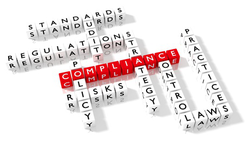
This working paper has served as a basis for an article written in French in the book Compliance : Entreprise, Régulateur, Juge ("Compliance: Enterprise, Regulator, Judge"), published in May 2018 in the Regulations Series of Dalloz editions (Paris).
See the other books published in this collection (presentation in French), directed by Marie-Anne Frison-Roche (presentation in English).
ABSTRACT: The Company, the Regulator and the Judge are three key figures for the construction of an emerging Compliance Law. An important risk lies in a confusion of their respective roles, the company becoming a regulator, the regulator becoming a board of a place that goes to the conquest of others, the judge standing back. It is appropriate that each plays his role and that their respective function is not distorted. If this confusion is avoided, then the points of contact can multiply and one observes it. But as soon as everyone remains in its place, we can go further than these points of contact and if they agreed, the three characters can reach common goals. This is all the more legitimate since Compliance Law, as Regulation Law, is teleological in nature, which makes these branches of law profoundly political. These common goals are technical, such as risk prevention. They can be more political and higher, if there is a shared will, without ever one of the characters being captured by another: it is then to concern by the human being. The designation of this common goal to the Company, the Regulator and the Judge can be expressed in one word: Europe.
June 27, 2018
Publications

Référence complète : Frison-Roche, M.-A., Le Juge, le Régulateur et le Droit, in L'ENA hors les murs, Le droit et la justice aujourd'hui. Et demain ?, n°481, 2018, pp.72-73.
Résumé. Du Juge, du Régulateur et du Droit, c'est plutôt le "Régulateur" qui vient en premier, mais cette prééminence vint parfois sur ordre du juge plutôt que sur décision autonome de l'État, même s'il s'avère que c'est toujours, voire avant tout, pour fonder une relation de confiance qu'un Régulateur est établi (I). Institué, le Régulateur doit se comporter dans ses pouvoirs ex post comme un Juge (II). Lorsque le Régulateur est en contact avec les juges, rapport obligé puisque que le Régulateur est soumis au Droit, l'entente est plus ou moins cordiale (III) et c'est la tension des relations entre Droit et Économie qui transparaît alors. Mais l'Europe est l'espace où les conciliations se font plus aisément, notamment grâce à la puissance et l'autorité de ses Juges, comme le montre l'Union bancaire (IV). La mondialisation ayant rebattu la carte des puissances et des dangers, les prétentions du Droit sont aujourd'hui internalisées dans les entreprises mêmes : le Droit de la Régulation se transforme en Droit de la Compliance, par lequel l'"entreprise cruciale" devient une structure qui juge et applique , y compris à elle-même, des normes mondiales pour atteindre des "buts monumentaux" exprimés par les États (V). En cela la "lutte pour le Droit" pourrait se faire dans un nouveau jeu entre les entreprises, les Juges et les Régulateurs.
Cet article s'appuie sur un document de travail.
Celui est doté de notes de bas de pages, de références techniques et de liens hypertextes.
Il est accessible en langue française par le lien suivant : Le Juge, le Régulateur et le Droit.
Il est accessible en langue anglaise par le lien suivant : The Judge, the Regulator and the Law.